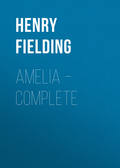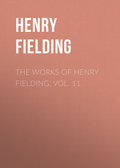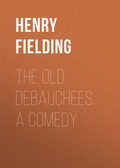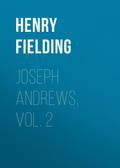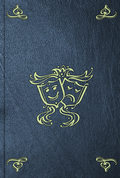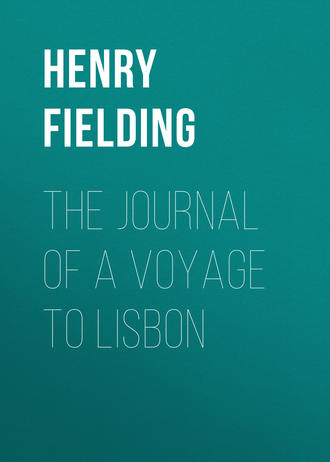
Генри Филдинг
The Journal of a Voyage to Lisbon
INTRODUCTION TO SEVERAL WORKS
When it was determined to extend the present edition of Fielding, not merely by the addition of Jonathan Wild to the three universally popular novels, but by two volumes of Miscellanies, there could be no doubt about at least one of the contents of these latter. The Journal of a Voyage to Lisbon, if it does not rank in my estimation anywhere near to Jonathan Wild as an example of our author's genius, is an invaluable and delightful document for his character and memory. It is indeed, as has been pointed out in the General Introduction to this series, our main source of indisputable information as to Fielding dans son naturel, and its value, so far as it goes, is of the very highest. The gentle and unaffected stoicism which the author displays under a disease which he knew well was probably, if not certainly, mortal, and which, whether mortal or not, must cause him much actual pain and discomfort of a kind more intolerable than pain itself; his affectionate care for his family; even little personal touches, less admirable, but hardly less pleasant than these, showing an Englishman's dislike to be "done" and an Englishman's determination to be treated with proper respect, are scarcely less noticeable and important on the biographical side than the unimpaired brilliancy of his satiric and yet kindly observation of life and character is on the side of literature.
There is, as is now well known since Mr. Dobson's separate edition of the Voyage, a little bibliographical problem about the first appearance of this Journal in 1755. The best known issue of that year is much shorter than the version inserted by Murphy and reprinted here, the passages omitted being chiefly those reflecting on the captain, etc., and so likely to seem invidious in a book published just after the author's death, and for the benefit, as was expressly announced, of his family. But the curious thing is that there is ANOTHER edition, of date so early that some argument is necessary to determine the priority, which does give these passages and is identical with the later or standard version. For satisfaction on this point, however, I must refer readers to Mr. Dobson himself.
There might have been a little, but not much, doubt as to a companion piece for the Journal; for indeed, after we close this (with or without its "Fragment on Bolingbroke"), the remainder of Fielding's work lies on a distinctly lower level of interest. It is still interesting, or it would not be given here. It still has – at least that part which here appears seems to its editor to have – interest intrinsic and "simple of itself." But it is impossible for anybody who speaks critically to deny that we now get into the region where work is more interesting because of its authorship than it would be if its authorship were different or unknown. To put the same thing in a sharper antithesis, Fielding is interesting, first of all, because he is the author of Joseph Andrews, of Tom Jones, of Amelia, of Jonathan Wild, of the Journal. His plays, his essays, his miscellanies generally are interesting, first of all, because they were written by Fielding.
Yet of these works, the Journey from this World to the Next (which, by a grim trick of fortune, might have served as a title for the more interesting Voyage with which we have yoked it) stands clearly first both in scale and merit. It is indeed very unequal, and as the author was to leave it unfinished, it is a pity that he did not leave it unfinished much sooner than he actually did. The first ten chapters, if of a kind of satire which has now grown rather obsolete for the nonce, are of a good kind and good in their kind; the history of the metempsychoses of Julian is of a less good kind, and less good in that kind. The date of composition of the piece is not known, but it appeared in the Miscellanies of 1743, and may represent almost any period of its author's development prior to that year. Its form was a very common form at the time, and continued to be so. I do not know that it is necessary to assign any very special origin to it, though Lucian, its chief practitioner, was evidently and almost avowedly a favorite study of Fielding's. The Spanish romancers, whether borrowing it from Lucian or not, had been fond of it; their French followers, of whom the chief were Fontenelle and Le Sage, had carried it northwards; the English essayists had almost from the beginning continued the process of acclimatization. Fielding therefore found it ready to his hand, though the present condition of this example would lead us to suppose that he did not find his hand quite ready to it. Still, in the actual "journey," there are touches enough of the master – not yet quite in his stage of mastery. It seemed particularly desirable not to close the series without some representation of the work to which Fielding gave the prime of his manhood, and from which, had he not, fortunately for English literature, been driven decidedly against his will, we had had in all probability no Joseph Andrews, and pretty certainly no Tom Jones. Fielding's periodical and dramatic work has been comparatively seldom reprinted, and has never yet been reprinted as a whole. The dramas indeed are open to two objections – the first, that they are not very "proper;" the second, and much more serious, that they do not redeem this want of propriety by the possession of any remarkable literary merit. Three (or two and part of a third) seemed to escape this double censure – the first two acts of the Author's Farce (practically a piece to themselves, for the Puppet Show which follows is almost entirely independent); the famous burlesque of Tom Thumb, which stands between the Rehearsal and the Critic, but nearer to the former; and Pasquin, the maturest example of Fielding's satiric work in drama. These accordingly have been selected; the rest I have read, and he who likes may read. I have read many worse things than even the worst of them, but not often worse things by so good a writer as Henry Fielding. The next question concerned the selection of writings more miscellaneous still, so as to give in little a complete idea of Fielding's various powers and experiments. Two difficulties beset this part of the task – want of space and the absence of anything so markedly good as absolutely to insist on inclusion. The Essay on Conversation, however, seemed pretty peremptorily to challenge a place. It is in a style which Fielding was very slow to abandon, which indeed has left strong traces even on his great novels; and if its mannerism is not now very attractive, the separate traits in it are often sharp and well-drawn. The book would not have been complete without a specimen or two of Fielding's journalism. The Champion, his first attempt of this kind, has not been drawn upon in consequence of the extreme difficulty of fixing with absolute certainty on Fielding's part in it. I do not know whether political prejudice interferes, more than I have usually found it interfere, with my judgment of the two Hanoverian-partisan papers of the '45 time. But they certainly seem to me to fail in redeeming their dose of rancor and misrepresentation by any sufficient evidence of genius such as, to my taste, saves not only the party journalism in verse and prose of Swift and Canning and Praed on one side, but that of Wolcot and Moore and Sydney Smith on the other. Even the often-quoted journal of events in London under the Chevalier is overwrought and tedious. The best thing in the True Patriot seems to me to be Parson Adams' letter describing his adventure with a young "bowe" of his day; and this I select, together with one or two numbers of the Covent Garden Journal. I have not found in this latter anything more characteristic than Murphy's selection, though Mr. Dobson, with his unfailing kindness, lent me an original and unusually complete set of the Journal itself.
It is to the same kindness that I owe the opportunity of presenting the reader with something indisputably Fielding's and very characteristic of him, which Murphy did not print, and which has not, so far as I know, ever appeared either in a collection or a selection of Fielding's work. After the success of David Simple, Fielding gave his sister, for whom he had already written a preface to that novel, another preface for a set of Familiar Letters between the characters of David Simple and others. This preface Murphy reprinted; but he either did not notice, or did not choose to attend to, a note towards the end of the book attributing certain of the letters to the author of the preface, the attribution being accompanied by an agreeably warm and sisterly denunciation of those who ascribed to Fielding matter unworthy of him. From these the letter which I have chosen, describing a row on the Thames, seems to me not only characteristic, but, like all this miscellaneous work, interesting no less for its weakness than for its strength. In hardly any other instance known to me can we trace so clearly the influence of a suitable medium and form on the genius of the artist. There are some writers – Dryden is perhaps the greatest of them – to whom form and medium seem almost indifferent, their all-round craftsmanship being such that they can turn any kind and every style to their purpose. There are others, of whom I think our present author is the chief, who are never really at home but in one kind. In Fielding's case that kind was narrative of a peculiar sort, half-sentimental, half-satirical, and almost wholly sympathetic – narrative which has the singular gift of portraying the liveliest character and yet of admitting the widest disgression and soliloquy.
Until comparatively late in his too short life, when he found this special path of his (and it is impossible to say whether the actual finding was in the case of Jonathan or in the case of Joseph), he did but flounder and slip. When he had found it, and was content to walk in it, he strode with as sure and steady a step as any other, even the greatest, of those who carry and hand on the torch of literature through the ages. But it is impossible to derive full satisfaction from his feats in this part of the race without some notion of his performances elsewhere; and I believe that such a notion will be supplied to the readers of his novels by the following volumes, in a very large number of cases, for the first time.
DEDICATION TO THE PUBLIC
Your candor is desired on the perusal of the following sheets, as they are the product of a genius that has long been your delight and entertainment. It must be acknowledged that a lamp almost burnt out does not give so steady and uniform a light as when it blazes in its full vigor; but yet it is well known that by its wavering, as if struggling against its own dissolution, it sometimes darts a ray as bright as ever. In like manner, a strong and lively genius will, in its last struggles, sometimes mount aloft, and throw forth the most striking marks of its original luster.
Wherever these are to be found, do you, the genuine patrons of extraordinary capacities, be as liberal in your applauses of him who is now no more as you were of him whilst he was yet amongst you. And, on the other hand, if in this little work there should appear any traces of a weakened and decayed life, let your own imaginations place before your eyes a true picture in that of a hand trembling in almost its latest hour, of a body emaciated with pains, yet struggling for your entertainment; and let this affecting picture open each tender heart, and call forth a melting tear, to blot out whatever failings may be found in a work begun in pain, and finished almost at the same period with life. It was thought proper by the friends of the deceased that this little piece should come into your hands as it came from the hands of the author, it being judged that you would be better pleased to have an opportunity of observing the faintest traces of a genius you have long admired, than have it patched by a different hand, by which means the marks of its true author might have been effaced. That the success of the last written, though first published, volume of the author's posthumous pieces may be attended with some convenience to those innocents he hath left behind, will no doubt be a motive to encourage its circulation through the kingdom, which will engage every future genius to exert itself for your pleasure. The principles and spirit which breathe in every line of the small fragment begun in answer to Lord Bolingbroke will unquestionably be a sufficient apology for its publication, although vital strength was wanting to finish a work so happily begun and so well designed. PREFACE THERE would not, perhaps, be a more pleasant or profitable study, among those which have their principal end in amusement, than that of travels or voyages, if they were wrote as they might be and ought to be, with a joint view to the entertainment and information of mankind. If the conversation of travelers be so eagerly sought after as it is, we may believe their books will be still more agreeable company, as they will in general be more instructive and more entertaining. But when I say the conversation of travelers is usually so welcome, I must be understood to mean that only of such as have had good sense enough to apply their peregrinations to a proper use, so as to acquire from them a real and valuable knowledge of men and things, both which are best known by comparison. If the customs and manners of men were everywhere the same, there would be no office so dull as that of a traveler, for the difference of hills, valleys, rivers, in short, the various views of which we may see the face of the earth, would scarce afford him a pleasure worthy of his labor; and surely it would give him very little opportunity of communicating any kind of entertainment or improvement to others.
To make a traveler an agreeable companion to a man of sense, it is necessary, not only that he should have seen much, but that he should have overlooked much of what he hath seen. Nature is not, any more than a great genius, always admirable in her productions, and therefore the traveler, who may be called her commentator, should not expect to find everywhere subjects worthy of his notice. It is certain, indeed, that one may be guilty of omission, as well as of the opposite extreme; but a fault on that side will be more easily pardoned, as it is better to be hungry than surfeited; and to miss your dessert at the table of a man whose gardens abound with the choicest fruits, than to have your taste affronted with every sort of trash that can be picked up at the green-stall or the wheel-barrow. If we should carry on the analogy between the traveler and the commentator, it is impossible to keep one's eye a moment off from the laborious much-read doctor Zachary Gray, of whose redundant notes on Hudibras I shall only say that it is, I am confident, the single book extant in which above five hundred authors are quoted, not one of which could be found in the collection of the late doctor Mead.
As there are few things which a traveler is to record, there are fewer on which he is to offer his observations: this is the office of the reader; and it is so pleasant a one, that he seldom chooses to have it taken from him, under the pretense of lending him assistance. Some occasions, indeed, there are, when proper observations are pertinent, and others when they are necessary; but good sense alone must point them out. I shall lay down only one general rule; which I believe to be of universal truth between relator and hearer, as it is between author and reader; this is, that the latter never forgive any observation of the former which doth not convey some knowledge that they are sensible they could not possibly have attained of themselves.
But all his pains in collecting knowledge, all his judgment in selecting, and all his art in communicating it, will not suffice, unless he can make himself, in some degree, an agreeable as well as an instructive companion. The highest instruction we can derive from the tedious tale of a dull fellow scarce ever pays us for our attention. There is nothing, I think, half so valuable as knowledge, and yet there is nothing which men will give themselves so little trouble to attain; unless it be, perhaps, that lowest degree of it which is the object of curiosity, and which hath therefore that active passion constantly employed in its service. This, indeed, it is in the power of every traveler to gratify; but it is the leading principle in weak minds only.
To render his relation agreeable to the man of sense, it is therefore necessary that the voyager should possess several eminent and rare talents; so rare indeed, that it is almost wonderful to see them ever united in the same person. And if all these talents must concur in the relator, they are certainly in a more eminent degree necessary to the writer; for here the narration admits of higher ornaments of style, and every fact and sentiment offers itself to the fullest and most deliberate examination. It would appear, therefore, I think, somewhat strange if such writers as these should be found extremely common; since nature hath been a most parsimonious distributor of her richest talents, and hath seldom bestowed many on the same person. But, on the other hand, why there should scarce exist a single writer of this kind worthy our regard; and, whilst there is no other branch of history (for this is history) which hath not exercised the greatest pens, why this alone should be overlooked by all men of great genius and erudition, and delivered up to the Goths and Vandals as their lawful property, is altogether as difficult to determine. And yet that this is the case, with some very few exceptions, is most manifest. Of these I shall willingly admit Burnet and Addison; if the former was not, perhaps, to be considered as a political essayist, and the latter as a commentator on the classics, rather than as a writer of travels; which last title, perhaps, they would both of them have been least ambitious to affect. Indeed, if these two and two or three more should be removed from the mass, there would remain such a heap of dullness behind, that the appellation of voyage-writer would not appear very desirable. I am not here unapprised that old Homer himself is by some considered as a voyage-writer; and, indeed, the beginning of his Odyssey may be urged to countenance that opinion, which I shall not controvert. But, whatever species of writing the Odyssey is of, it is surely at the head of that species, as much as the Iliad is of another; and so far the excellent Longinus would allow, I believe, at this day.
But, in reality, the Odyssey, the Telemachus, and all of that kind, are to the voyage-writing I here intend, what romance is to true history, the former being the confounder and corrupter of the latter. I am far from supposing that Homer, Hesiod, and the other ancient poets and mythologists, had any settled design to pervert and confuse the records of antiquity; but it is certain they have effected it; and for my part I must confess I should have honored and loved Homer more had he written a true history of his own times in humble prose, than those noble poems that have so justly collected the praise of all ages; for, though I read these with more admiration and astonishment, I still read Herodotus, Thucydides, and Xenophon with more amusement and more satisfaction. The original poets were not, however, without excuse. They found the limits of nature too straight for the immensity of their genius, which they had not room to exert without extending fact by fiction: and that especially at a time when the manners of men were too simple to afford that variety which they have since offered in vain to the choice of the meanest writers. In doing this they are again excusable for the manner in which they have done it.
Ut speciosa dehine miracula promant.
They are not, indeed, so properly said to turn reality into fiction, as fiction into reality. Their paintings are so bold, their colors so strong, that everything they touch seems to exist in the very manner they represent it; their portraits are so just, and their landscapes so beautiful, that we acknowledge the strokes of nature in both, without inquiring whether Nature herself, or her journeyman the poet, formed the first pattern of the piece. But other writers (I will put Pliny at their head) have no such pretensions to indulgence; they lie for lying sake, or in order insolently to impose the most monstrous improbabilities and absurdities upon their readers on their own authority; treating them as some fathers treat children, and as other fathers do laymen, exacting their belief of whatever they relate, on no other foundation than their own authority, without ever taking the pains or adapting their lies to human credulity, and of calculating them for the meridian of a common understanding; but, with as much weakness as wickedness, and with more impudence often than either, they assert facts contrary to the honor of God, to the visible order of the creation, to the known laws of nature, to the histories of former ages, and to the experience of our own, and which no man can at once understand and believe. If it should be objected (and it can nowhere be objected better than where I now write,1 as there is nowhere more pomp of bigotry) that whole nations have been firm believers in such most absurd suppositions, I reply, the fact is not true. They have known nothing of the matter, and have believed they knew not what. It is, indeed, with me no matter of doubt but that the pope and his clergy might teach any of those Christian heterodoxies, the tenets of which are the most diametrically opposite to their own; nay, all the doctrines of Zoroaster, Confucius, and Mahomet, not only with certain and immediate success, but without one Catholic in a thousand knowing he had changed his religion.
What motive a man can have to sit down, and to draw forth a list of stupid, senseless, incredible lies upon paper, would be difficult to determine, did not Vanity present herself so immediately as the adequate cause. The vanity of knowing more than other men is, perhaps, besides hunger, the only inducement to writing, at least to publishing, at all. Why then should not the voyage-writer be inflamed with the glory of having seen what no man ever did or will see but himself? This is the true source of the wonderful in the discourse and writings, and sometimes, I believe, in the actions of men. There is another fault, of a kind directly opposite to this, to which these writers are sometimes liable, when, instead of filling their pages with monsters which nobody hath ever seen, and with adventures which never have, nor could possibly have, happened to them, waste their time and paper with recording things and facts of so common a kind, that they challenge no other right of being remembered than as they had the honor of having happened to the author, to whom nothing seems trivial that in any manner happens to himself.
Of such consequence do his own actions appear to one of this kind, that he would probably think himself guilty of infidelity should he omit the minutest thing in the detail of his journal. That the fact is true is sufficient to give it a place there, without any consideration whether it is capable of pleasing or surprising, of diverting or informing, the reader. I have seen a play (if I mistake not it is one of Mrs. Behn's or of Mrs. Centlivre's) where this vice in a voyage-writer is finely ridiculed. An ignorant pedant, to whose government, for I know not what reason, the conduct of a young nobleman in his travels is committed, and who is sent abroad to show my lord the world, of which he knows nothing himself, before his departure from a town, calls for his Journal to record the goodness of the wine and tobacco, with other articles of the same importance, which are to furnish the materials of a voyage at his return home. The humor, it is true, is here carried very far; and yet, perhaps, very little beyond what is to be found in writers who profess no intention of dealing in humor at all. Of one or other, or both of these kinds, are, I conceive, all that vast pile of books which pass under the names of voyages, travels, adventures, lives, memoirs, histories, etc., some of which a single traveler sends into the world in many volumes, and others are, by judicious booksellers, collected into vast bodies in folio, and inscribed with their own names, as if they were indeed their own travels: thus unjustly attributing to themselves the merit of others.
Now, from both these faults we have endeavored to steer clear in the following narrative; which, however the contrary may be insinuated by ignorant, unlearned, and fresh-water critics, who have never traveled either in books or ships, I do solemnly declare doth, in my own impartial opinion, deviate less from truth than any other voyage extant; my lord Anson's alone being, perhaps, excepted. Some few embellishments must be allowed to every historian; for we are not to conceive that the speeches in Livy, Sallust, or Thucydides, were literally spoken in the very words in which we now read them. It is sufficient that every fact hath its foundation in truth, as I do seriously aver is the ease in the ensuing pages; and when it is so, a good critic will be so far from denying all kind of ornament of style or diction, or even of circumstance, to his author, that he would be rather sorry if he omitted it; for he could hence derive no other advantage than the loss of an additional pleasure in the perusal.
Again, if any merely common incident should appear in this journal, which will seldom I apprehend be the case, the candid reader will easily perceive it is not introduced for its own sake, but for some observations and reflections naturally resulting from it; and which, if but little to his amusement, tend directly to the instruction of the reader or to the information of the public; to whom if I choose to convey such instruction or information with an air of joke and laughter, none but the dullest of fellows will, I believe, censure it; but if they should, I have the authority of more than one passage in Horace to allege in my defense. Having thus endeavored to obviate some censures, to which a man without the gift of foresight, or any fear of the imputation of being a conjurer, might conceive this work would be liable, I might now undertake a more pleasing task, and fall at once to the direct and positive praises of the work itself; of which indeed, I could say a thousand good things; but the task is so very pleasant that I shall leave it wholly to the reader, and it is all the task that I impose on him. A moderation for which he may think himself obliged to me when he compares it with the conduct of authors, who often fill a whole sheet with their own praises, to which they sometimes set their own real names, and sometimes a fictitious one. One hint, however, I must give the kind reader; which is, that if he should be able to find no sort of amusement in the book, he will be pleased to remember the public utility which will arise from it. If entertainment, as Mr. Richardson observes, be but a secondary consideration in a romance; with which Mr. Addison, I think, agrees, affirming the use of the pastry cook to be the first; if this, I say, be true of a mere work of invention, sure it may well be so considered in a work founded, like this, on truth; and where the political reflections form so distinguishing a part. But perhaps I may hear, from some critic of the most saturnine complexion, that my vanity must have made a horrid dupe of my judgment, if it hath flattered me with an expectation of having anything here seen in a grave light, or of conveying any useful instruction to the public, or to their guardians. I answer, with the great man whom I just now quoted, that my purpose is to convey instruction in the vehicle of entertainment; and so to bring about at once, like the revolution in the Rehearsal, a perfect reformation of the laws relating to our maritime affairs: an undertaking, I will not say more modest, but surely more feasible, than that of reforming a whole people, by making use of a vehicular story, to wheel in among them worse manners than their own.



